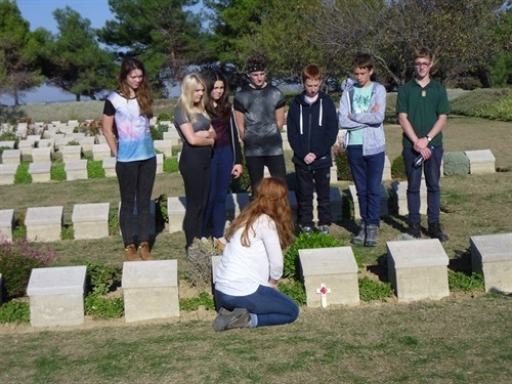Pupils from a British school have visited Gallipoli as part of a new education programme marking the 100th anniversary of the Allied landings in Turkey in 1915.
The Gallipoli Centenary Education Project – jointly funded by the UK Heritage Lottery Fund and the Gallipoli Association – has been setting up activities in advance of the 2015 Centenary commemorations of a campaign which cost tens of thousands of British, Commonwealth, French and Turkish lives.
Eight pupils, from Bay House School in Gosport, won places on the pilot battlefield trip by writing letters of application and submitting ideas for short plays based on the history of the campaign.
Submarines
Gosport, on the western side of Portsmouth Harbour, is home to the Royal Navy Submarine Museum. The students, aged 13-17, prepared for their visit to Turkey by working with museum staff to discover how submarines played a major part in the 1915 attempt to force a passage through the heavily defended Dardanelles Strait.
Along with two teachers, a film-maker, tour guide and staff from the Project, the pupils followed in the footsteps of more than 500,000 Allied soldiers and sailors who were sent to the Gallipoli peninsula with the aim of knocking the Ottoman Empire out of the First World War.
They explored the battlefields in the Helles, Anzac and Suvla sectors, learning about the campaign and what life was like for the men from all the countries that took part. Short commemorations were held at graves and memorials to some of the men from the town of Gosport who fell at Gallipoli.
The students also had the opportunity to meet Turkish counterparts to exchange views on the campaign, and performed a short play developed during the three day trip.
 Looking out over Suvla Bay (Photo: courtesy of the Gallipoli Centenary Education Project)
Looking out over Suvla Bay (Photo: courtesy of the Gallipoli Centenary Education Project)
Here are some words from the students themselves:
*‘Before, I didn’t see the war as such a big event. I thought it only involved Europe and it didn’t really have any effect on my current life, but that was so wrong. I didn’t think about the piles of dead or the fact that other countries were affected. I’m glad I now know.’ (Jake, 16)
*‘It’s made me really appreciate how much they really meant to us. If I knew someone who was very dear to me who fought in a war, and in a hundred years they were forgotten, even though they were heroes, I would be really upset.’ (Gemma, 13)
The Gallipoli Centenary Education Project is funded through a £100,000 grant from the Heritage Lottery Fund and private donations of £35,000 from members of the Gallipoli Association.
It has a two-year programme of activities in the UK, working with regional partnerships of schools and museums in areas with strong Gallipoli connections – Lancashire, Hampshire, Devon, London, South Lanarkshire and the Scottish Borders.
The project runs until spring 2016 and will include at least one more visit to Gallipoli as well as local projects around the UK, a conference for schools and further international exchanges.
One of the aims is to develop international links between schools in the countries which sent soldiers to Gallipoli, including Ireland, France, Turkey, Germany, Australia, New Zealand, Canada and India. In one teacher’s words ‘we study it because it helps us discover what made the Great War into a World War’.
For more information contact the National Coordinator, Robin Clutterbuck: robin@gallipoli100.co.uk
Information & pictures supplied by the Gallipoli Centenary Education Project.
Posted by: Peter Alhadeff, Centenary News
